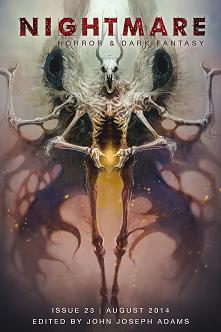Reviewed by Lillian Csernica
“Upon the Body” by Ben Peek tells the story of a sin-eater nearing the end of his career who comes to remove the full body tattoos that tell the life story of the great gunfighter, Arryo Salazar. The sin-eater has been summoned there by the gunfighter’s wife, Sonia Salazar. Most of the story is about Arryo’s life and what drove him to kill so many people. No matter what Arryo wanted to believe about himself, the tattoos tell the truth. In this world the mortician does the tattooing on people from their childhoods onward so at the end of their lives God can read the history of what they’ve done, good and evil.
The best thing I can say about this story is that while I was reading it, the song “Seven Spanish Angels” kept playing in my mind. I was shocked to find errors in punctuation and grammar that have nothing to do with the narrative voice or characterization. Words are missing. There is no real problem situation, because it’s never made clear how the sin-eater actually eats the sins, and what spiritual benefit Salazar will gain given that he’s still alive. All the sin-eater really does is remove the tattoos through a nasty process that can and will kill Salazar. Why it doesn’t do so almost immediately makes no sense to me. There’s also an unfocused thread of revolution running through the story. The worldbuilding doesn’t hang together well enough to convince me of the political realities behind the big dramatic statements made in the narrative. Last but far from least, “Upon the Body” lacks the truly nightmarish quality that’s the thematic hallmark of this magazine.
“Dear Owner of This 1972 Ford Crew Cab Pickup” by Desirina Boskovich
“Dear Owner of This 1972 Ford Crew Cab Pickup” is the salutation that begins every note written by the main character to the bartender who leaves work at three a.m. The pickup’s engine makes a godawful amount of noise that keeps waking up the main character, so she keeps writing notes in the futile hope that the bartender will take the hint and park somewhere else. Sleep deprivation takes its toll, costing the main character her teaching job which is her only means of paying the hospital bills for her dying mother. Given what a scumbag the bartender is depicted as being and the utter hopelessness of the main character, the ending is no surprise. The unlikely and unnecessary twist thrown in at the last minute does nothing to ramp up the tension.
